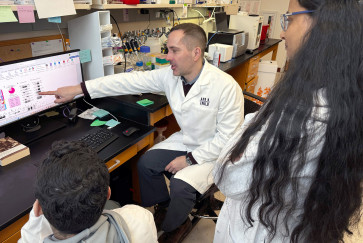Most people who have pulled an all-nighter are all too familiar with that “tired and wired” feeling. Although the body is physically exhausted, the brain feels slap-happy, loopy and almost giddy.
Now, Northwestern University neurobiologists are the first to uncover what produces this punch-drunk effect. In a new study, researchers induced mild, acute sleep deprivation in mice and then examined their behaviors and brain activity. Not only did dopamine release increase during the acute sleep loss period, synaptic plasticity also was enhanced — literally rewiring the brain to maintain the bubbly mood for the next few days.
These new findings could help researchers better understand how mood states transition naturally. It also could lead to a more complete understanding of how fast-acting antidepressants (like ketamine) work and help researchers identify previously unknown targets for new antidepressant medications.
The research will be published online Nov. 2 in the journal Neuron. Northwestern postdoctoral fellow Mingzheng Wu is the paper’s first author, and Professor Yevgenia Kozorovitskiy is the corresponding author.
“Chronic sleep loss is well studied, and it’s uniformly detrimental effects are widely documented,” Kozorovitskiy said. “But brief sleep loss — like the equivalent of a student pulling an all-nighter before an exam — is less understood. We found that sleep loss induces a potent antidepressant effect and rewires the brain. This is an important reminder of how our casual activities, such as a sleepless night, can fundamentally alter the brain in as little as a few hours.”
An expert in neuroplasticity, Kozorovitskiy is an associate professor of neurobiology and the Irving M. Klotz Professor at Northwestern’s Weinberg College of Arts and Sciences.
Signs of sleep loss
Scientists long have known that acute perturbations in sleep are associated with altered mental states and behaviors. Alterations of sleep and circadian rhythms in patients, for example, can trigger mania or occasionally reverse depressive episodes.
“Interestingly, changes in mood state after acute sleep loss feel so real, even in healthy subjects, as experienced by myself and many others,” Wu said. “But the exact mechanisms in the brain that lead to these effects have remained poorly understood.”



